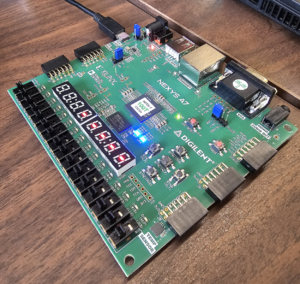Xilinx FPGA: Difference between revisions
Jump to navigation
Jump to search
No edit summary |
No edit summary |
||
| (3 intermediate revisions by the same user not shown) | |||
| Line 1: | Line 1: | ||
[[File:Picture of Digilent NEXYS A7.png|thumb]] | |||
I am using [https://digilent.com/shop/nexys-a7-fpga-trainer-board-recommended-for-ece-curriculum/ Digilent NEXYS A7 FPGA learning board]. It uses a Xilinx Artix®-7 FPGA. Xilinx is now under AMD. | I am using [https://digilent.com/shop/nexys-a7-fpga-trainer-board-recommended-for-ece-curriculum/ Digilent NEXYS A7 FPGA learning board]. It uses a Xilinx Artix®-7 FPGA. Xilinx is now under AMD. | ||
{|class='wikitable' | |||
| FPGA || XC7A100T-1CSG324C | |||
|- | |||
| Logic Slices || 15850 ( 1 Logic Slices = 4 Logic cell) | |||
|- | |||
| 6-inputs Look-Up Table (LUT) || 1188 | |||
|- | |||
| Shift Register [Kb] || 594 | |||
|- | |||
| Flip-Flops || 126800 | |||
|- | |||
| Block RAM [kBit] || 4860 | |||
|- | |||
| Memory || DDR 128 [MiB] (ISSI, IS43/46DR16640C) | |||
|} | |||
=AMD Vivado Design Suite= | =AMD Vivado Design Suite= | ||
| Line 13: | Line 30: | ||
sudo ln -s /usr/lib/x86_64-linux-gnu/libtinfo.so.6 /usr/lib/x86_64-linux-gnu/libtinfo.so.5 | sudo ln -s /usr/lib/x86_64-linux-gnu/libtinfo.so.6 /usr/lib/x86_64-linux-gnu/libtinfo.so.5 | ||
sudo ln -s /usr/lib/x86_64-linux-gnu/libncurses.so.6 /usr/lib/x86_64-linux-gnu/libncurses.so.5 | sudo ln -s /usr/lib/x86_64-linux-gnu/libncurses.so.6 /usr/lib/x86_64-linux-gnu/libncurses.so.5 | ||
=== install the Cable Driver === | |||
In Linux, the driver needs to be manually install. | |||
go to the Vivado install directory | |||
cd <Vivado Install>/data/xicom/cable_drivers/lin64/install_script/install_drivers/ | |||
./install_drivers | |||
=== Run === | |||
my installation is | |||
>cd /tools/Xilinx/Vivado/2024.1 | |||
>source settings64.sh | |||
>vivado | |||
= A simple program = | |||
A youtube video '''5 - End-to-End FPGA Project on the Nexys A7''' by Anas Salah Eddin is very good introduction. | |||
= Reset the board = | |||
Press the PROG red button | |||
Revision as of 13:02, 12 July 2024
I am using Digilent NEXYS A7 FPGA learning board. It uses a Xilinx Artix®-7 FPGA. Xilinx is now under AMD.
| FPGA | XC7A100T-1CSG324C |
| Logic Slices | 15850 ( 1 Logic Slices = 4 Logic cell) |
| 6-inputs Look-Up Table (LUT) | 1188 |
| Shift Register [Kb] | 594 |
| Flip-Flops | 126800 |
| Block RAM [kBit] | 4860 |
| Memory | DDR 128 [MiB] (ISSI, IS43/46DR16640C) |
AMD Vivado Design Suite
AMD Vivado Design Suite is a software tool used to design and develop hardware circuitry for programmable devices like Field-Programmable Gate Arrays (FPGAs) and System-on- a-Chip (SoC) made by AMD.
require libraries
sudo apt install libtinfo-dev libtinfo.so.6 libncurses.so.6
the suite actually needs libtinfo5 and ncurses5. but we can cheat it by creating symbolic links
sudo ln -s /usr/lib/x86_64-linux-gnu/libtinfo.so.6 /usr/lib/x86_64-linux-gnu/libtinfo.so.5 sudo ln -s /usr/lib/x86_64-linux-gnu/libncurses.so.6 /usr/lib/x86_64-linux-gnu/libncurses.so.5
install the Cable Driver
In Linux, the driver needs to be manually install.
go to the Vivado install directory
cd <Vivado Install>/data/xicom/cable_drivers/lin64/install_script/install_drivers/ ./install_drivers
Run
my installation is
>cd /tools/Xilinx/Vivado/2024.1 >source settings64.sh >vivado
A simple program
A youtube video 5 - End-to-End FPGA Project on the Nexys A7 by Anas Salah Eddin is very good introduction.
Reset the board
Press the PROG red button
